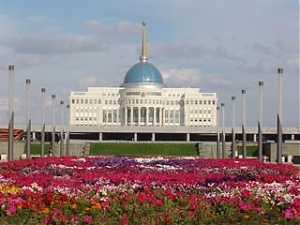Baltic States – CIS, EU – Baltic States, Legislation, Press-release
International Internet Magazine. Baltic States news & analytics
Thursday, 20.02.2025, 11:14
Europe comes to Asia
 Print version
Print version |
|---|
Kazakhstan's Chairmanship in the OSCE will be an important event for the young state, indicating the growing importance of post-Soviet states in the international arena. This applies particularly to Kazakhstan, occupying an important position on the geopolitical map of the world, and also has the second after Russia reserves of strategic raw materials.
Chairmanship of the OSCE to Kazakhstan will be a real test of the maturity of the state and the ability to lead a “major international game”. But also a test to build the country's democratic society. It's no secret that many in Europe perceive this country as one of a number of Central Asian despotisms. It is well understood in Kazakhstan. According to Foreign Minister Kanat Saudabayev “Our Chairmanship of the OSCE will give a powerful impetus to further democratization not only in Kazakhstan but also in the whole of Central Asia. This will help strengthen stability and security in our region.”
In the meantime, European leaders diplomatically prefer to emphasize the successes of Kazakhstan in the field of “building a stable state”. For example, French President Nicolas Sarkozy said that “Kazakhstan plays an important role in Central Asia as a bulwark of stability”, and stressed that “as the first country of CIS, which will chair the OSCE, Kazakhstan's role” will be significant for the future of the organization and its capacity.
A Finnish Foreign Minister Alexander Stubb, who served as Chairman of the Council of Foreign Ministers of OSCE in the year of the Finnish Presidency of the Organization (2008), visited Astana (Capital of Kazakhstan) in the Summer of 2008, said that “Kazakhstan's forthcoming Chairmanship in the OSCE has a historic and symbolic significance. In 2010, the OSCE will celebrate 35 years, and Kazakhstan will be the first Central Asian country, the Presidency of the Organization.” By his opinion, the Presidency of Kazakhstan in the OSCE is the opportunity to show that this unique organization is on a par with the UN and the EU. He stressed at the same time that “Kazakhstan has a strategic role in Central Asia.”
Next, it seems that Kazakhstan's Presidency will be marked by major innovations in the OSCE activities.
For example, President Nursultan Nazarbayev has proposed the idea to resume regular Summits of the Organization. The last meeting of heads of OSCE member-states took place ten years ago, in November 1999 in Istanbul. In December 2008, Nazarbayev proposed to hold a summit in Astana in 2010, during the Chairmanship of the Organization. “Given the rapidly changing global environment in the need to give new impetus to the OSCE, an important semantic sound gets the idea of convening a Summit of the Organization”, – says the President of Kazakhstan.
This initiative was supported by French President Nicolas Sarkozy during a visit to Kazakhstan in early October this year. The leader of France expressed his eagerness to take part in this summit. He stressed at the same time that “Kazakhstan plays an important role in maintaining stability in the region.” Turning to the head of Kazakhstan, the French President said: “We need you and in resolving the crisis in Afghanistan, and Iran, and in establishing new relations with our friends from Russia.”
The idea of the 2010 OSCE Summit was endorsed by members of the OSCE Parliamentary Assembly meeting in Athens in mid-October this year.
This assessment is shared by many European observers. According to Stefan Meister, an expert on Central Asia from the German Society for Foreign Policy (Die Deutsche Gesellschaft für Auswärtige Politik – DGAP), the European interest to Kazakhstan is based on the fact that it is the most stable and the most attractive country for business in the Central Asian region. According to mr. Meister, Central Asia is important for Europe, first of all, thanks to its significant energy resources. But not only. Europe has a great interest in cooperation with the countries of the region and in the nuclear field and in the construction of trans-continental transport corridors.
Ariel Cohen, Fellow of the Heritage Foundation (US), believes that Kazakhstan can play a positive role in the development of the OSCE on all three fronts, or “dimensions” of the Organization – (a) military & political, (b) economic & environmental and (c) human rights.
The Chairman of the OSCE has the right to a year to set priorities for the Organization activities. Priorities, which Kazakhstan intends to raise, are connected primarily with its status as a multi-ethnic and multi-confessional country. They are closely connected with civilizational specifics of this country – both European and Islamic. The position of Kazakhstan as an inter-civilizational “bridge”, underlines the fact that in 2011, when the OSCE will be chaired by Lithuania, Kazakhstan will become Chairman of the Organization of the Islamic Conference (OIC), largest inter-governmental organization of the Muslim world.








 «The Baltic Course» Is Sold and Stays in Business!
«The Baltic Course» Is Sold and Stays in Business!

